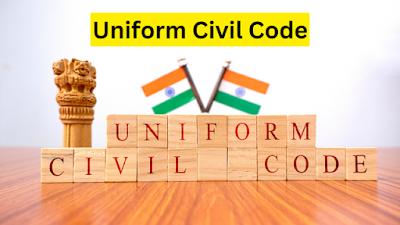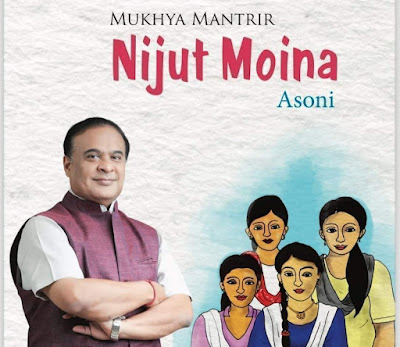Uniform Civil Code in India : Everything you need to know about Uniform Civil Code for UPSC Mains
Hello, aspirants are you preparing for UPSC/APSC Mains exam? If yes, then you must be aware of the most important topic on Indian Politics the Uniform Civil Code : Origin of Uniform Civil Code, Constitutional Status and Historical Cases for APSC Mains exam preparation. Therefore every aspirants of UPSC and APSC need to know about Uniform Civil Code in India for UPSC-APSC Mains exam preparation. In this regard “World_Polity” decides to provide you the most important Uniform Civil Code in India for APSC Mains. Therefore read carefully entire detail of the Uniform Civil Code for APSC Mains : Origin of Uniform Civil Code, Constitutional Status and Historical Cases.
Uniform Civil Code for APSC
Uniform Civil Code for UPSC Mains
In this article we have provided you most important Uniform Civil Code in India for UPSC. So, read these most important & relevant subject of Indian Politics the Uniform Civil Code in India for UPSC – APSC Mains exam.
Uniform Civil Code for APSC Mains : Origin of Uniform Civil Code, Constitutional Status and Historical Cases
What is Uniform Civil Code ?
The Uniform Civil Code (UCC) calls for the formulation of one law for India, which would be applicable to all religious communities in matters such as marriage, divorce, inheritance, adoption. The code comes under Article 44 of the Constitution, which lays down that the state shall endeavour to secure a Uniform Civil Code for the citizens throughout the territory of India.
The issue has been at the center of political narrative and debate for over a century and a priority agenda for the Bharatiya Janata Party (BJP) which has been pushing for the legislation in Parliament. The saffron party was the first to promise the implementation of UCC if it comes to power and the issue was part of its 2019 Lok Sabha election manifesto.
Why is Article 44 important?
The objective of Article 44 of the Directive Principles in the Indian Constitution was to address the discrimination against vulnerable groups and harmonise diverse cultural groups across the country. Dr. B R Ambedkar, while formulating the Constitution had said that a UCC is desirable but for the moment it should remain voluntary, and thus the Article 35 of the draft Constitution was added as a part of the Directive Principles of the State Policy in part IV of the Constitution of India as Article 44. It was incorporated in the Constitution as an aspect that would be fulfilled when the nation would be ready to accept it and the social acceptance to the UCC could be made.
Ambedkar in his speech in the Constituent Assembly had said, “No one need be apprehensive that if the State has the power, the State will immediately proceed to execute…that power in a manner may be found to be objectionable by the Muslims or by the Christians or by any other community. I think it would be a mad government if it did so.”
Origin of Uniform Civil Code
The origin of the UCC dates back to colonial India when the British government submitted its report in 1835 stressing the need for uniformity in the codification of Indian law relating to crimes, evidence, and contracts, specifically recommending that personal laws of Hindus and Muslims be kept outside such codification.
Increase in legislations dealing with personal issues in the far end of the British rule forced the government to form the B N Rau Committee to codify Hindu law in 1941. The task of the Hindu Law Committee was to examine the question of the necessity of common Hindu laws. The committee, in accordance with scriptures, recommended a codified Hindu law, which would give equal rights to women. The 1937 Act was reviewed and the committee recommended a civil code of marriage and succession for Hindus.
What is the Supreme Court saying about UCC?
The Supreme Court in various judgments has called for the implementation of the UCC. In its Mohd. Ahmed Khan vs Shah Bano Begum judgment of 1985, where a divorced Muslim woman demanded maintenance from her former husband, the SC while deciding whether to give prevalence to the CrPc or the Muslim personal law, called for the implementation of the UCC.
The Court also called on the government to implement the UCC in the 1995 Sarla Mudgal judgment, and in the Paulo Coutinho vs Maria Luiza Valentina Pereira case (2019).
What did the Law Commission say about UCC?
In 2018, the Law Commission submitted a 185-page consultation paper on the reform of family law at the Modi government’s request. The Law Commission stated that UCC “is neither necessary nor desirable at this stage”, the report recommended that discriminatory practices, prejudices, and stereotypes within a particular religion and its personal laws should be studied and amended.
Uniform Civil Code and Historical Cases ::
Shah Bano Case :
The Shah Bano case, also known as Mohammad Ahmed Khan v. Shah Bano Begum, was brought before the Indian Supreme Court for the first time in the year 1985. The court instructed Parliament to draught a Uniform Civil Code in connection with the case. Shah Bano’s case was about obtaining maintenance money from her husband after she had triple talaq in accordance with Section 125 of the Code of Criminal Procedure.
The Muslim Women (Right to Protection on Divorce) Act of 1986, however, allowed the government to overturn the judgment in her case. According to this Act, a Muslim woman was not permitted to request maintenance under the earlier Act. By 2017, Triple Talaq, also known as talaq-e-bidat in the community, had been declared unconstitutional and illegal.
Sarla Mudgal vs Union of India :
The Sarla Mudgal Case, which raised the issue of bigamy and disagreement over marriage-related issues within the current personal laws, was another significant case that gained attention. The Hindu Marriage Act of 1955 states that just one of the grounds enumerated therein may be used to dissolve a Hindu marriage that has been solemnized in conformity with Hindu law, according to the court. Since the Hindu marriage is not immediately void under the law, a second marriage that is solemnized after converting to Islam would be prohibited under section 494 of the Indian Penal Code (IPC).
What will Uniform Civil Code do?
The UCC aims to provide protection to vulnerable sections as envisaged by Ambedkar including women and religious minorities, while also promoting nationalistic fervour through unity. When enacted the code will work to simplify laws that are segregated at present on the basis of religious beliefs like the Hindu code bill, Shariat law, and others. The code will simplify the complex laws around marriage ceremonies, inheritance, succession, adoptions making them one for all. The same civil law will then be applicable to all citizens irrespective of their faith.
Uniform Civil Code and Arguments For & Against ::
Arguments in favour of the Uniform Civil Code:
Arguments in Favor of the Uniform Civil Code :
The topic of implementing a UCC in India has been a subject of debate and discussion, with arguments both for and against it.
Below we have listed the arguments in favor of UCC :
• Equality and Secularism : Supporters argue that a UCC would promote equality and secularism by treating all citizens equally under one law, regardless of their religious beliefs. It would eliminate discriminatory practices and ensure equal rights and opportunities for all, regardless of their religious affiliations.
• Gender Justice : Advocates claim that a UCC would promote gender justice by addressing discriminatory practices prevalent in personal laws across religions. Uniformity in marriage, divorce, and inheritance laws would help in ensuring equal rights and protection for women, eliminating gender-based discrimination.
• National Integration : Proponents argue that a UCC would strengthen national integration by fostering a sense of unity and shared identity among diverse religious communities. It would promote social cohesion and harmony by bridging the gaps created by different personal laws based on religion.
Arguments Against the Uniform Civil Code :
The Uniform Civil Code (UCC) is a proposal for a single set of civil laws to govern personal matters, such as marriage, divorce, inheritance, and adoption, for all citizens of India, irrespective of their religion. However, there have been some arguments made against UCC’s implementation.
• Protection of Minority Rights : Opponents argue that implementing a UCC would undermine the rights of religious and cultural minorities. They believe that personal laws based on religion are an integral part of the cultural identity and autonomy of minority communities, and any attempt to impose a uniform code would infringe upon their rights to practice and preserve their customs and traditions.
• Pluralism and Diversity : Critics contend that a UCC would disregard the rich diversity of India and the coexistence of multiple religious and cultural practices. They argue that personal laws based on religious principles are an essential aspect of preserving the pluralistic fabric of the country, allowing different communities to uphold their unique customs and traditions.
• Feasibility and Consensus : Some argue that implementing a UCC is not feasible due to the complex and sensitive nature of personal laws. They claim that it would require extensive consultation and consensus-building among various religious groups, which may be challenging to achieve. Any attempt to impose a UCC without adequate consensus could lead to social unrest and discontent.
Uniform Civil Code – Challenges in its Implementation
• The task of actually devising a set of rules that will govern all communities is a very formidable and tedious one considering the vast range of interests and sentiments to be accounted for.
• Misinformation about UCC – Content of UCC has not been spelt out leading minorities to believe that it is a way of imposing majority views on them.
• Lack of political will due to the complexity and sensitivity of the issue.
• Different religious communities have different personal laws which lead to the politicization of the UCC debate.
• Opponents of UCC argue that personal laws are derived from religious beliefs. They maintain that it is prudent not to disturb them, as this runs the risk of engendering a great deal of animosity and tension between various religious communities.
Also, India being a secular country guarantees its minorities the right to follow their own religion, culture and customs under Article 29 and 30. They argue that implementing UCC will contravene these articles.
Suggestions for Implementing a Uniform Civil Code :
• To realize the goals of the DPSP and to maintain the uniformity of laws, the following suggestions need immediate consideration:
• A progressive and broadminded outlook should be encouraged among the people to understand the spirit of the UCC. For this, education, awareness and sensitisation programmes must be taken up.
• The Uniform Civil Code should be drafted keeping in mind the best interest of all the religions.
• A committee of eminent jurists should be constituted to maintain uniformity and care must be taken not to hurt the sentiments of any particular community.
• The matter being sensitive in nature, it is always better if the initiative comes from the religious groups concerned.
How many Indian states have Uniform Civil Code?
• Talking about the Uniform Civil Code, one cannot ignore Goa.
• The Goa Civil Code is in force since Portuguese times and is considered a Uniform Civil Code.
• In 1867, Portugal enacted a Portuguese civil code and in 1869 it was extended to Portugal’s overseas provinces (that included Goa). However, it is quite complex on the ground.
• The Uttarakhand government on May 27 last year announced its decision to implement the Uniform Civil Code in the state.
• The State government constituted the five-member committee led by Desai, to prepare a draft proposal for implementation of the UCC.
• Uttarakhand Chief Minister Pushkar Singh Dhami has earlier said that the committee will submit its report by June 30 this year.
• Earlier, Assam Chief Minister Himanta Biswa Sarma underlined the need for the implementation of the Uniform Civil Code in the state and said that the introduction of the legislation is necessary to give justice to all Muslim women.
• The Gujarat government has also supported the implementation of the Uniform Civil Code.
Conclusion
Personal law reforms must begin with community enlightenment before any changes can be made.
An essential part of preparing for this transformation is the democratic reform and strengthening of current institutions. For real gender equality, women of all faiths should be accorded the same consideration as men. Plural democracy is what makes modern India what it is. Since India’s population is so varied, efforts should encourage togetherness rather than enforce uniformity.
• Must visit : Types of Laws in Indian Judicial System
• Must visit : Key Highlights of Indian Prime Minister visit to France 2023
• Must visit : Role of Mann ki Baat Programme of PM of India APSC 2022
UPSC Questions Related to Uniform Civil Code ::
1. What is the meaning of Civil Code?
– A civil code is a systematic collection of laws designed to deal with the core areas of private law such as for dealing with business and negligence lawsuits and practices.
2. What is the Article 44?
– Article 44 of the Indian Constitution defines a Uniform Civil Code. Article 44 says, ‘The State shall endeavour to secure for the citizens a Uniform Civil Code throughout the territory of India.’ The article is a part of the Directive Principles of State Policy.
3. Why does Goa have a uniform civil code?
– The Goa Civil Code, also known as the Goa Family Law, was introduced in 1870 by the Portuguese who were ruling the state. After the liberation of Goa in 1961, the civil code was retained.
4. When was the Hindu code bill passed?
– The Hindu Code Bills are a set of laws that were passed in the 1950s.
Now World_Polity is on every platform you can connect with us by just clicking the below social media links. Thank You.
• Subscribe our Youtube channel
• Join our Facebook Page
• Join our telegram Channel
* Recent Top Most Searches :
• Rights of Minorities and Problems of Minorities in India
• Religious Fundamentalism – Rise of Religious and Hindu Fundamentalism in India
Well if you like the article on Uniform Civil Code for APSC Mains : Origin of Uniform Civil Code, Constitutional Status and Historical Cases, do comment & show your support by sharing it to the other aspirants and if there is any query you are welcome to ask.



